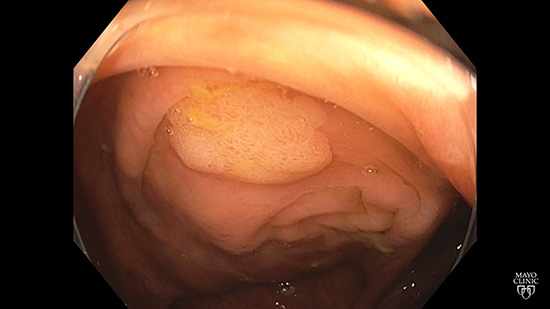-
Cancer
Science Saturday: Identifying characteristics of colon polyps most likely to progress to cancer

Researchers at Mayo Clinic are closer to answering the question, why does one colon polyp transform to cancer while another seemingly identical polyp does not? A colon polyp is a small clump of cells that forms on the lining of the colon. While most colon polyps are harmless some can develop into colon cancer, which can be fatal if found too late.
“The molecular determinants that distinguish normal, benign polyps from those at risk for becoming cancer are unclear,” says Lisa Boardman, M.D. a gastroenterologist at Mayo Clinic. “In our paper, published in the journal Scientific Reports, we asked the question: why does one polyp transform to cancer while another, that is clinically and histologically identical, does not?”
To answer this question, Dr. Boardman and her colleagues used next-generation sequencing techniques to molecularly characterize and compare colorectal polyps from Mayo Clinic patients that were associated with cancer with those from patients with polys that were benign.
Next-generation sequencing is sophisticated DNA and RNA sequencing technology which allows researchers to study biological systems at a level never before possible.
Dr. Boardman and her colleagues found that polyps adjacent to cancerous tissue exhibited distinct genetic alterations from polyps that remained cancer free. “By integrating multiple sequencing platforms, we identified a panel of 124 genes that were differentially altered between polyps that were associated with cancer and polyps that did not progress to colorectal cancer,” she says. “These results serve as a foundational study showing that polyps with and without cancer exhibit distinct molecular signatures.”
Dr. Boardman says the ability to identify molecular features that predict whether a polyp will transform to cancer would be a major clinical step in individualizing the care of patients with polyps. She says current national guidelines for polyp surveillance are still based only upon polyp size, number, histology and degree of dysplasia. She adds that there are currently no blood or tissue-based molecular tests used to tailor surveillance intervals for patients with polyps.
Dr. Boardman says the ability to determine a polyp’s risk for progression to cancer could have significant benefits for patients and the health care system including reducing costs, reducing risks and improving the use of colonoscopy. “This study is also the first step in our efforts to establish a pre-cancer biobank at Mayo Clinic, which will support future studies on polyps in order to prolong health by preventing pre-malignancy in the colon.”
This article can be found on the Advancing the Science blog.
_________________________________________________
Other Mayo Clinic medical research websites:
- Research at Mayo Clinic
- Discovery’s Edge
- Advancing the Science
- Forefront
- Mayo Clinic Center for Individualized Medicine
- Mayo Clinic Center for Innovation
- Center for Regenerative Medicine
- Center for the Science of Health Care Delivery







